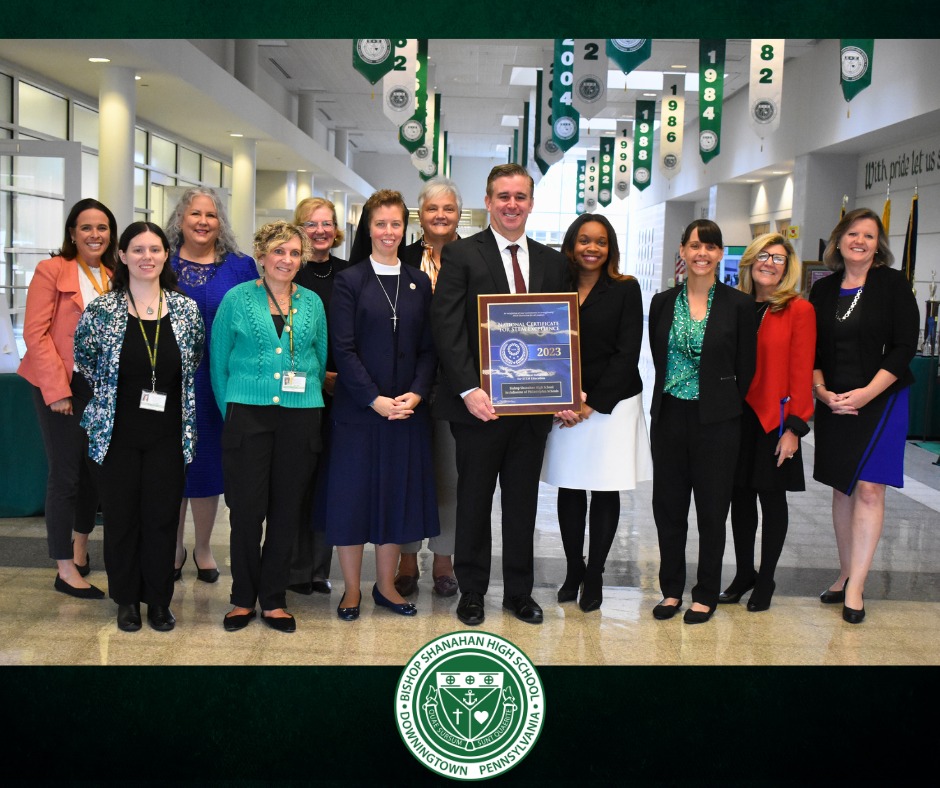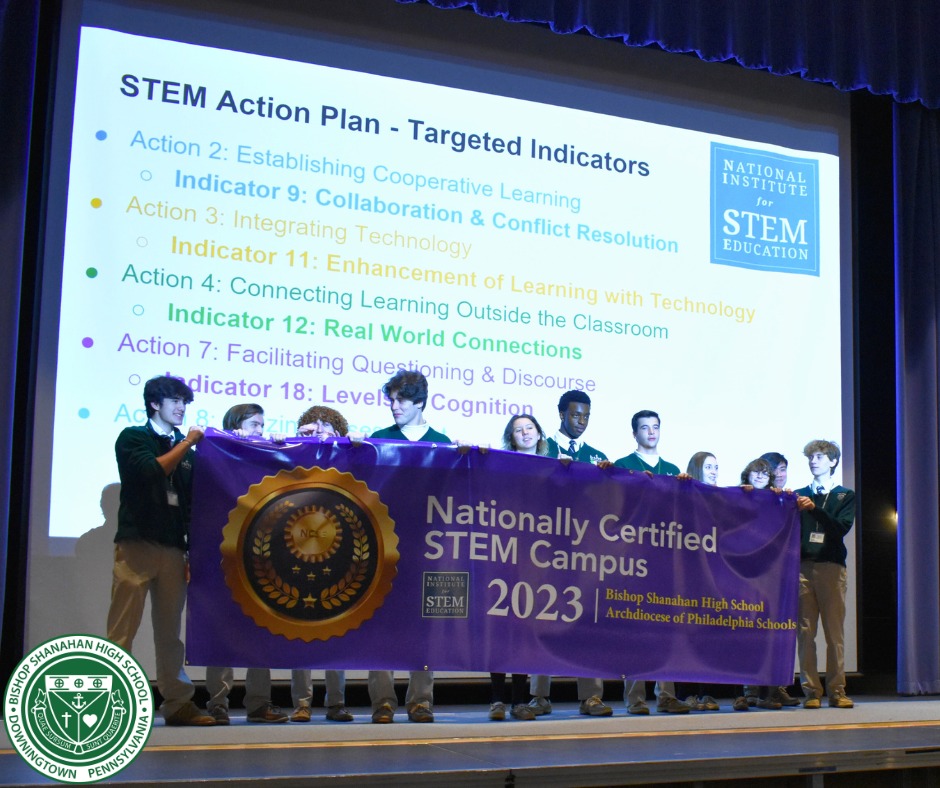Big wins are always fun to celebrate, but they also require a high level of commitment and teamwork.
The Bishop Shanahan High School community gathered to celebrate a major win recently, but this victory didn’t happen due to an amazing catch or hit. It happened because of the school’s focus on helping students become future leaders and problem solvers through its Science, Technology, Engineering and Math (STEM) curriculum.
The hard work and dedication of school administrators and teachers led to Bishop Shanahan becoming the first high school in Pennsylvania to earn the National STEM Certification from the National Institute for STEM Education (NISE) and the first Catholic high school in the country to earn this distinguished honor. Less than 1% of U.S. schools have achieved this distinction.
In addition to the school earning this prestigious designation, Shanahan teachers Corinne Alfano, Janet Moore, Immaculate Heart of Mary Sister Christina Marie Roberts, Lisa Rossana, Jennifer Scullin, and Michele Verratti earned a National Certificate in STEM Teaching.
“That was probably an even more intense process than the campus certification because it forced them to look at their own teaching, do multiple classroom observations, and submit plans to NISE,” said Robert Moran, principal of Bishop Shanahan High School. “We also relied on those six teachers to take their learning and share it with other teachers.”
The school’s STEM Pathways program, an initiative that began four years ago, gives all Shanahan students the opportunity to take STEM classes, the principal explained.
“By exposing all our students to STEM, perhaps it will inspire them to pursue it further,” Moran said. “Female students have been a particular focus because there’s a big push nationally to increase women in STEM. The president of our STEM Capstone team this year is a female student, so that’s something we’re very proud of as well.”
Moran noted that the STEM curriculum has made learning a more interactive experience for students.
“It creates engaging lessons in classrooms through which they’re doing hands-on learning,” he said. “They’re not just listening to a teacher give out information, but they’re being empowered to identify a problem and solve a problem. It gives them the opportunity to have hands-on, inquiry-based learning, and it gives them the skills they will need in college and in the future, skills like collaboration, creative, and critical thinking.”
Three years ago Shanahan created a STEM certificate program for students interested in pursuing a STEM career. The program allows students to earn additional elective STEM course credits, attend STEM speaker series events, and then complete a STEM Capstone project during their senior year.
“If they complete all those requirements, they earn a STEM certificate at graduation in addition to their high school diploma,” Moran said.
He explained that the NISE certification process began last year and required the school to review its curriculum and instructional strategies and design a professional development plan to give teachers the tools across the curriculum to implement STEM instructional strategies in their classrooms.
“In earning the STEM certificate for the campus, it was all about us promoting student-centered, inquiry-based, problem-solving instructional strategies across the curriculum,” Moran said. “It was a pretty intensive process.”
Preparing students for post-secondary study and careers in STEM is a key part of the school’s strategic plan.
“We recognized that a lot of our students were going into the STEM field, and the STEM instruction really gives our students a competitive edge when they get into college and they’re searching for a career path,” Moran said. “I think it helps students to be critical thinkers and problem solvers, and those are skills they will need not just in college, but throughout their careers.”
The principal emphasized the importance of Catholic school students having the ability to solve problems through the lens of Catholic morality and ethics and Catholic social teaching.
“Our world is full of problems, and STEM is all about solving problems,” Moran said.
“Our world needs Catholic school students to be the leaders and problem solvers of tomorrow. STEM education empowers them to be the ethical problem solvers of the future.”
The certification celebration on Oct. 17 included a schoolwide assembly with presentations by Moran, a Shanahan student and teacher, and Dr. Marissa Prather, NISE STEM Leadership Coach. Dr. Brooke C. Tesche, Archdiocese of Philadelphia Superintendent of Secondary Schools and Schools of Special Education, Nancy Kurtz, Assistant Superintendent of Secondary Schools, and Bernadette Dougherty, Assistant Superintendent of Elementary Schools, and Bishop Shanahan High School board members also attended the celebration.
Moran said the school received a banner from NISE, which is now on display in the school lobby, and a plaque from NISE is hanging in the main office.
“Earning this certification shows our commitment to stay at the forefront of innovative teaching and learning, recognizing that we are surrounded by a lot of quality private and public schools,” Moran said.
“We are thrilled and proud of the work of our teachers and of our leadership team and ultimately of our students because they’re the ones who carry out the learning and the projects that we put in place. It was a very proud moment for the whole school.”

From left to right, back row: Mrs. Janet Moore; Mrs. Lisa Rossana; Mrs. Beth Harper Briglia (BSHS Board Chair); Mrs. Mary Kay Hennessy ’75. Front left to right, front row: Ms. Corinne Alfano; Mrs. Michele Verratti; Sister Christina Marie Roberts, IHM; Dr. Robert Moran (BSHS Principal); Dr. Marissa Prather (NISE STEM Leadership Coach); Dr. Brooke Tesche (Archdiocese of Philadelphia Superintendent of Secondary Schools & Schools of Special Education); Mrs. Bernadette Dougherty (AOP Assistant Superintendent of Elementary Schools); and Mrs. Nancy Kurtz (AOP Assistant Superintendent of Secondary Schools). Not pictured: Mrs. Jennifer Scullin; Mrs. Teresa Dellicompagni. (Courtesy Photo)
PREVIOUS: Letter Released from the Delegates of the 16th Ordinary General Assembly of the Synod of Bishops
NEXT: CRS Rice Bowl Sees Largest-Ever Lenten Collection This Year



Share this story